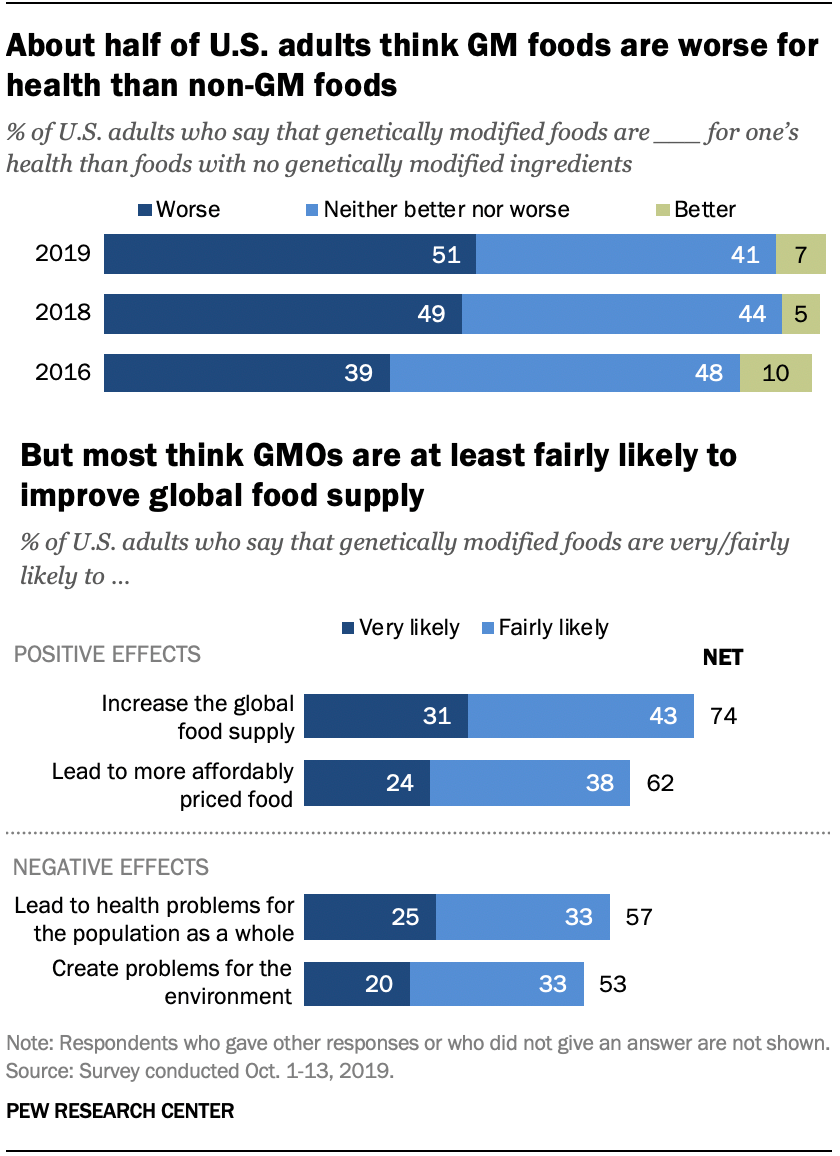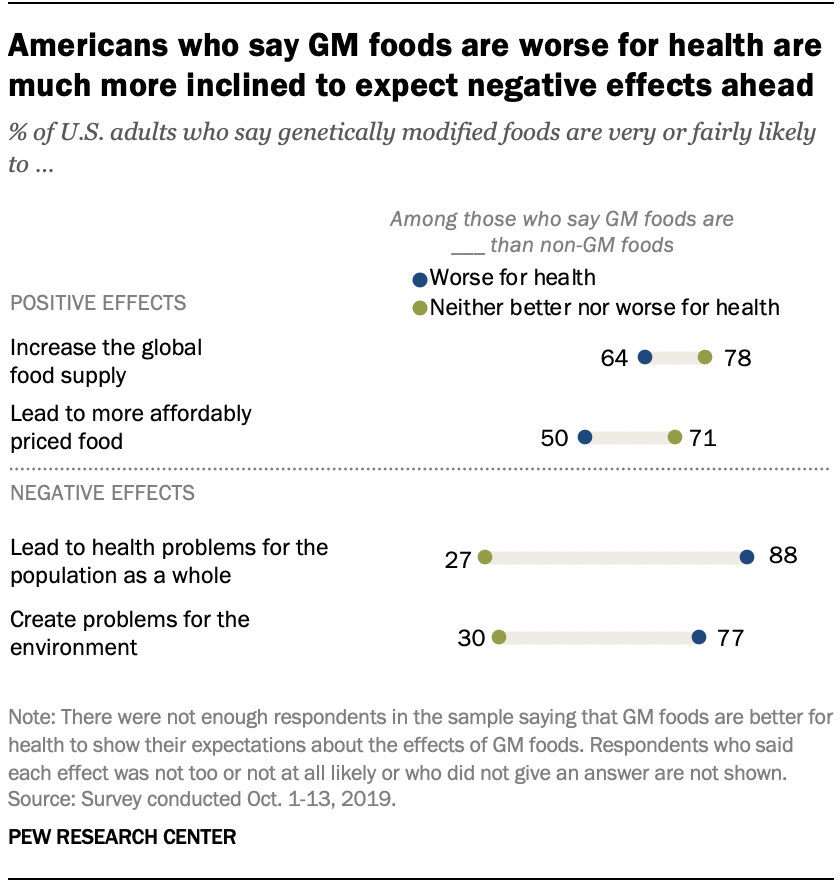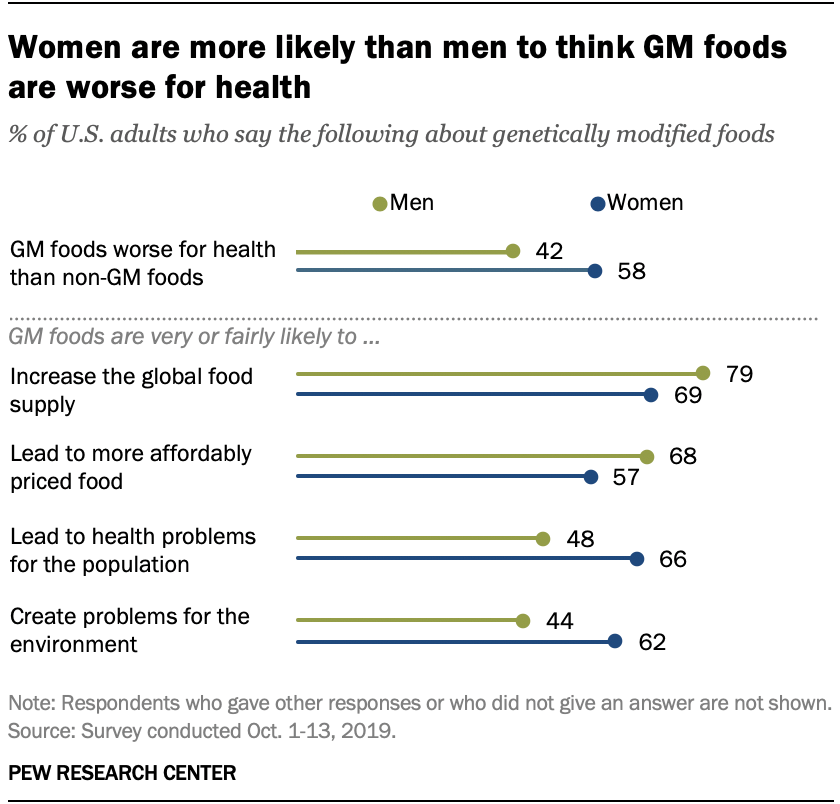 Americans have mixed views about genetically modified foods (GMOs) and their implications for society. About half of U.S. adults (51%) think GMOs are worse for people’s health than foods with no genetically modified ingredients, while 41% say GM foods have a neutral effect on health. Just 7% say they are better for health than other foods.
Americans have mixed views about genetically modified foods (GMOs) and their implications for society. About half of U.S. adults (51%) think GMOs are worse for people’s health than foods with no genetically modified ingredients, while 41% say GM foods have a neutral effect on health. Just 7% say they are better for health than other foods.
Views about the health effects of such foods grew more negative between 2016 and 2018 and have been steady since then, according to Pew Research Center surveys, the latest of which was conducted in October 2019.
As Americans think about the effects of GMOs, about three-quarters (74%) say it is at least fairly likely that GM foods will increase the global food supply. And 62% say GM foods are very or fairly likely to lead to more affordably priced food.
Pew Research Center has been tracking the American public’s attitudes about genetically modified foods as part of its continuing research on public views on scientific and technological developments. These findings are based on a survey conducted Oct. 1-13, 2019, among 3,627 U.S. adults.
Everyone who took part is a member of Pew Research Center’s American Trends Panel, an online survey panel that is recruited through national, random sampling of residential addresses. Recruiting our panelists by phone or mail ensures that nearly all U.S. adults have a chance of selection. This gives us confidence that any sample can represent the whole population (see our Methods 101 explainer on random sampling). To further ensure that each survey reflects a balanced cross section of the nation, the data is weighted to match the U.S. adult population by gender, race, ethnicity, partisan affiliation, education and other categories.
The margin of sampling error for the full sample is plus or minus 2.1 percentage points. Ratings of the health effects of genetically modified foods were asked of 1,811 U.S. adults; the margin of error for all asked is plus or minus 2.9 percentage points. Here are the questions used for this report, along with responses, and its methodology.
 Indeed, many of those who consider genetically modified foods worse for health than conventionally grown foods see both positive and negative effects ahead for society. A strong majority of this group thinks GM foods are at least fairly likely to result in health problems for the population as a whole (88%) or create problems for the environment (77%). At the same time, half or more also say that such foods are at least fairly likely to help increase the global food supply (64%) or result in more affordably priced food (50%).
Indeed, many of those who consider genetically modified foods worse for health than conventionally grown foods see both positive and negative effects ahead for society. A strong majority of this group thinks GM foods are at least fairly likely to result in health problems for the population as a whole (88%) or create problems for the environment (77%). At the same time, half or more also say that such foods are at least fairly likely to help increase the global food supply (64%) or result in more affordably priced food (50%).
Those who believe that genetically modified foods are neither better nor worse for health than conventionally grown foods tend to expect positive benefits from GM foods for the global food supply (78% say an increase is very or fairly likely). But only about three-in-ten of this group thinks GM foods are at least fairly likely to result in health problems for the population as a whole (27%) or problems for the environment (30%). The 7% of U.S. adults who say that GM foods are better for health than other foods make up too small a sample for separate analysis.
 Women are more inclined than men to believe that GM foods are worse for health (58% vs. 42%). Similarly, women are more likely to think GMOs are at least fairly likely to result in health problems for the population as a whole or to create problems for the environment.
Women are more inclined than men to believe that GM foods are worse for health (58% vs. 42%). Similarly, women are more likely to think GMOs are at least fairly likely to result in health problems for the population as a whole or to create problems for the environment.
Roughly three-in-ten U.S. adults (29%) report that they have heard a lot about foods with genetically modified ingredients, while 59% have heard a little and 12% say they have heard nothing at all about these foods. People who are more familiar with genetically modified foods are more likely to be concerned about their health effects: 55% of those who know a lot and a similar share (51%) of those who know a little about GM foods believe such foods are worse for health, compared with 39% of those who say they know nothing about GM foods.
Note: Here are the questions used for this report, along with responses, and its methodology.



